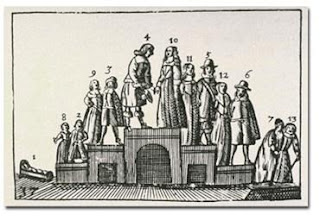 The most extensive and intensive experiences I had in nursing homes were the years that Joyce's mother, suffering from Alzheimer's, was in one facility in Aurora, then another near Akron. But Joyce has written about this so wonderfully well in her book In a Tangled Wood: An Alzheimer's Journey (1996) that I will add nothing to her words--except a link to her book! (In a Tangled Wood) Okay ... I will add only this--how astonishing it was to watch, over a period of years, one person disappear and another one emerge. And how Joyce profoundly loved them both.
The most extensive and intensive experiences I had in nursing homes were the years that Joyce's mother, suffering from Alzheimer's, was in one facility in Aurora, then another near Akron. But Joyce has written about this so wonderfully well in her book In a Tangled Wood: An Alzheimer's Journey (1996) that I will add nothing to her words--except a link to her book! (In a Tangled Wood) Okay ... I will add only this--how astonishing it was to watch, over a period of years, one person disappear and another one emerge. And how Joyce profoundly loved them both.
And now ... my own mother. This is not her first time in rehab, though. Some years ago she was in a bad one-car accident, broke her neck, and had to wear one of those "halo" devices for some months. Those were not the happiest days of her life. It frustrated her deeply to have to live like that--unable to move much, dependent on others. She had/has always been a fiercely independent person and prided herself greatly on her health and overall physical condition. In her 70s she was hiking long portions of the trail along the Pacific coast in Oregon with groups of her friends. She swam every morning in her 80s. Walked everywhere.
And then ... injury and years caught up with her, grabbed hold, would not let go.
There is anger in nursing homes--some is medicated away, some percolates. When I was visiting my mother last week, an angry resident was out in the hall near her room. I don't want to be here! he was saying. I don't need to be here! The attendants spoke with him softly, gently guided him back to his walker, which he'd tossed aside. Let him vent. Did not argue. They didn't need to. He knew his situation. But he hated it.
The therapists are trying to get my mother to use her walker more prudently. She doesn't want it at all. She tries to get by without any help--or with a cane only. But several falls in recent months have landed her right where she doesn't want to be. I walked down the hall with her and a therapist the other day. Short steps. The therapist urging her to lift her feet--not shuffle them. Mom was trying, ferociously trying. But tiring after only half the hallway. I slipped the wheelchair behind her. She sagged into it, resting. Then the long, long walk back to her room. A Pacific coast trail ...
Two things: Older people--like the rest of us--need touching. There's something about it, isn't there? The human hand. The touch. My mom was never a very physically affectionate woman. But I had my hands on her a lot this past weekend. She seemed to like it. Reached for me now and then.
And this: Why do so many people talk to the elderly as if they're children? Urging them on as if they're learning how to stand or walk or write the letter A? The "cutesy" little language we use with toddlers? My mother is not a toddler. She is a woman who lived through the Depression, who raised three sons during World War II and Korea while her husband was often away, who taught English in junior high and high school, who went back to grad school--nights, summers--until she earned her Ph.D. at the University of Pittsburgh, who taught doctoral students at Drake University, who ... who hiked at 75 the trail along the Pacific coast, who looked out over an ocean, drew in her breath with astonishment and wonder and gratitude, and has now plunged on, into the tangled wood.



No comments:
Post a Comment